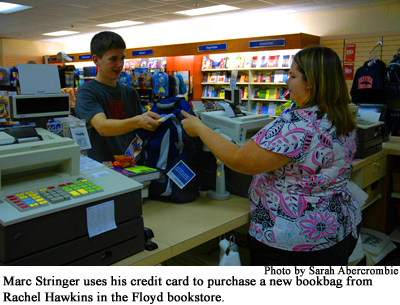Lifestyles |
Debt proves a constant concern for studentsBy Jehna Holder 
Student loans and credit cards allow many college students to attend institutions and purchase things they otherwise might not be able to afford with cash. When these tools are used responsibly, each can contribute to a better quality of life both while attending college and after graduation. However, when they are abused, the damage done to one�s credit, along with the other problems that accompany seemingly insurmountable debt, can haunt a person for decades after college graduation. College students are easy targets for lending institutions. Dr. John Reiners, associate professor of business and economics, said, �When college students get their first credit card, it is hard to resist the temptation of overspending and can always be a difficult issue later in life. Being out on your own is an easy way to run up credit cards and then no one knows where to turn or who to contact for help.� In today�s society there are two choices when paying for something: paper or plastic. Most of the time, people choose plastic. Seeing a $100 bill disappear into the cash register is much harder than simply signing a receipt with a number at the bottom telling how much was spent. When students use credit cards or another form of payment other than cash, they may not consider that they are spending actual money, money that they do not have. Here are some tips and ideas from the Consumer Counseling Credit Services website at www.cccsatl.org and the Federal Trade Commission website at www.ftc.gov that may be helpful in using credit cards and loans responsibly. 1) Avoid credit cards which have annual fees and account setup charges. These cards are often given to those who have little to no credit or who have damaged their credit beyond immediate repair. A $69 annual fee may not seem like a large amount of money to spend to gain access to a $1000 credit line. However, if one has, let�s say, three cards of this type, it will cost well over $200 a year to carry those cards, and that is all before the first swipe. 2) When searching for a good student loan, look for loans which are subsidized by the government. Taking this type of loan does not mean that a student is borrowing money from the government. In actuality, the student is borrowing the money from a bank or lending institution, but the money is guaranteed by the government to the bank in the event of default. Banks� lending guidelines are more lax on government subsidized loans. Since the money is going to be paid back either way, getting a government subsidized loan is normally easier for students than other means of borrowing money for school. 3) For a first credit card, look for cards made especially for students from the larger companies such as Citigroup, Capital One and Discover. Most of these companies have an image to maintain along with their bottom line, so they provide cards with small credit lines and no annual fees. Some even have rewards programs that allow students to receive discounts at certain stores and even on airfare and hotels. Most also allow cardholders to pay their bills online. 4) Check your credit report at least once per year. It is possible to obtain a free credit report by visiting www.freecreditreportsinstantly.com. There are many options to help you climb out of the hole. Credit counseling services help to re-organize debts and lower interest rates to make paying the loan easier. Some lending institutions and even credit card companies offer debt consolidation loans, which pay off all debts and consolidate the total into one large loan with a single monthly payment. Debt is not necessarily an �evil,� but it is dangerous. Like all dangerous things, when debt is treated with respect and responsibility, bad consequences can often be avoided. The bottom line is this: when standing in a check-out line, if the cashier asks if this will be a cash or credit transaction, say cash. That is the only way to avoid debt in today�s society. |